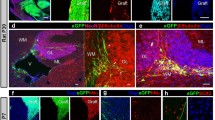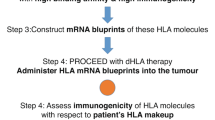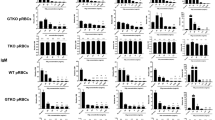Abstract
Wistar rats were sensitized to rat embryonic tissue by immunization with irradiated (5000 rad) rat embryo cells (2 X 10(6) s.c. + 1 X 10(6) i.p.) derived from embryos aged 14-15 days, or by implantation of irradiated (5000 rad) tissue grafts from these embryos. Three to five immunizations were given at weekly intervals, and the rats were then challenged subcutaneously 7-10 days after the final inoculum with minimal tumour-producing tumour cell doses. Immunization with irradiated rat embryo cells failed to influence the growth and development of tumour cells prepared from hepatoma D23 and D30, sarcoma Mc57, mammary carcinoma AAF57 or cells prepared from spontaneously arising mammary carcinomata Sp4 and Sp15. Using adoptive transfer techniques, lymphoid cells from embryo-sensitized rats, when used in a 3000 : 1 ratio (lymphoid cells : tumour cells), were shown effectively to retard the growth of hepatoma D23 in 3 out of 7 experiments performed. Similar adoptive transfer procedures proved ineffective in preventing the growth of mammary carcinoma AAF57. Using in vitro cytotoxicity tests, lymph node cells and spleen cells from embryo-immunized rats were shown to be cytotoxic for several rat tumour cell targets : hepatoma D23 (7/10 tests), sarcoma Mc7 (8/12 tests), mammary carcinoma AAF57 (2/2 tests) and Sp4 (3/4 tests), and for 14-15-day-old rat embryo cells (5/10 tests). In comparative tests lymphoid cells were relatively non-cytotoxic for 20-day-old rat embryo cells (1/6 tests) or cells prepared from adult rat lung or kidney (1/10 tests). The role of embryonic antigen(s) in tumour rejection is discussed.
This is a preview of subscription content, access via your institution
Access options
Subscribe to this journal
Receive 24 print issues and online access
$259.00 per year
only $10.79 per issue
Buy this article
- Purchase on Springer Link
- Instant access to full article PDF
Prices may be subject to local taxes which are calculated during checkout
Similar content being viewed by others
Rights and permissions
About this article
Cite this article
Shah, L., Rees, R. & Baldwin, R. Tumour rejection in rats sensitized to embryonic tissue. I. Rejection of tumour cells implanted s.c. and detection of cytotoxic lymphoid cells. Br J Cancer 33, 577–583 (1976). https://doi.org/10.1038/bjc.1976.94
Issue Date:
DOI: https://doi.org/10.1038/bjc.1976.94
This article is cited by
-
Tumour-associated antigens
Zeitschrift für Krebsforschung und Klinische Onkologie (1977)



